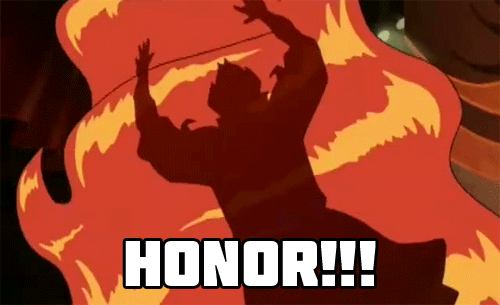(Zuko from The Boy in the Iceberg)
In the story Twenty-Two Goblins, the King is rewarded because of his impeccable, untiring honor. This code of honor seems to be a rather common motif in Indian tales. In a previous class I read parts of the Ramayana and this same code was seen throughout. Perhaps it is just the culture difference, but these two tales seem to carry this notion of honor far above and beyond anything western folklore will say. If Twenty-Two Goblins had been a German or Swedish tale, the king would have had to answer three riddles, maybe five or six if it was an especially long tale. But twenty-two times, without lying or just gagging the stupid goblin, is far too many for a western folktale. Yet time and again the king returns to the tree and begins his task anew, without wavering or faltering, without bitterness or despair.
All this, merely because a priest who honored him has asked him to. The King doesn’t know what the priest wants with the goblin, what his plans are (which turn out to be quite nefarious), or anything about this man other than he keeps giving the King precious stones. The process seems quite like the Arthurian Romance theme of a rash boon: the granting of a favor before you know what it is. Countless times a knight will ask King Arthur for a favor, and Arthur will agree before ever hearing what it is, which normally gets them into a bit of trouble. But the King in Twenty-Two Goblins isn’t granting this. It’s not a rash boon, but instead his sense of honor repaid that drives the King to endure this challenge. It is a cultural norm that goes above and beyond the most chivalrous code of honor in any western tale. It’s fascinating. It’s infuriating.
You read these tales and think ‘please just gag that stupid goblin already!’ But due to this code of honor the King can do no less than be an annoyingly perfect individual and not act with a single toe out of line. The same thing happened in the Ramayana, where Rama willingly goes into exile in the woods to ensure his father will remain honorable in granting a rash boon, and Rama is genuinely happy to do this. The King in Twenty-Two Goblins holds the exact same set of standards for his code of honor, and undertakes this long, arduous task of getting the goblin while also holding to the goblin’s rules in this riddle game. The motif is interesting, but hard to understand from a western perspective because I spend the whole time wondering why no one will just shut the goblin up so they can complete the task and go home. If being sneaky to get the job completed correctly goes against the motif, then I guess dishonor on me, but I’ll get to sleep before anyone else.
(If you don't know - DISHONOR ON YOU)
______________________________________________________________________________
Image Info:
Image one is Prince Zuko from the show Avatar: The Last Airbender. More specifically, an episode called The Ember Island Players where the show spoofs itself and the characters go watch a play that is basically a summary of their adventures up to this point. Web source.
Image two is Mushu from Mulan. Seriously guys, do I even need to put this here? Web source.


Elizabeth! Your gif's are cracking me up! I totally understand what you mean though! So. Much. Honor! But what is really cool about it is that you can see what they prioritize in their culture and what is most important to them. It is our beliefs and values that drive our actions.
ReplyDelete